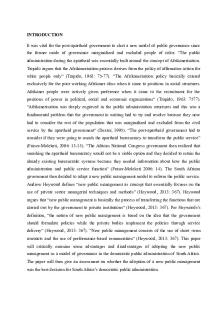Article The Public Perception of Cults and New Religious Movements PDF

| Title | Article The Public Perception of Cults and New Religious Movements |
|---|---|
| Course | Contem Topics In Crju |
| Institution | Texas Christian University |
| Pages | 4 |
| File Size | 98.3 KB |
| File Type | |
| Total Downloads | 60 |
| Total Views | 148 |
Summary
Dr. Ashley Wellman Contemporary Topics in CRJU Cults class. Class was mostly documentary-based....
Description
Article: The Public Perception of "Cults" and "New Religious Movements" Wednesday, April 24, 2019
1:00 PM
• Seeks to determine if simply substituting an alternative term for cult changes people's attitudes toward a religious group • Over 2,400 randomly selected Nebraskans were asked how comfortable they would feel if their neighbor joined a cult, New Religious Movement (NRM), or a "new Christian church" and whether government should be able to regulate the activities of these groups • Results reveal the remarkably negative view Nebraskans have of cults, their general acceptance of NRMs, and their broad support for new Christian churches • Merely using the world cult to describe a group elicits negative, stereotypical images about what the group is like before any factual information has been obtained • Alternative religious movements, emergent religious, or marginal religious movements are alternative ways to describe groups commonly referred to as cults • "New religious movements" has gained a strong foothold in the sociology of religion • 814 Nebraskans were asked about their feelings toward cults, 831 asked about their feelings toward NRMs, and 769 asked about new Christian churches • Pfeifer (1992): explored the issue by randomly assigning 98 undergrads to read indoctrination scenarios in which the only difference between the scenarios was the group a young man joined ○ Moonies, Marines, or a Catholic seminary ○ Found that participants were much more critical of the Moonies and a large majority preferred the term "brainwashing" to describe the process of joining the Moonies, but less used the words for the others ○ Also felt that the man who joined the Moonies was less happy with life before joining, less intelligent, less responsible, and more
with life before joining, less intelligent, less responsible, and more likely to have been coerced into joining ○ Nearly 75% described cults negatively ○ Despite this 80.2% admitted they had no contact with a cult member ○ 91% said opinions were based off of the media • Richardson and Van Driel (1997): found that media had overwhelming bias on NRMS • This study's data was collected as a part of the 2003 Nebraska Annual Social Indicators Survey (NASIS) by the Bureau of Sociological Research at University of Nebraska--Lincoln • Questions (words changed out): ○ "Researchers at the university are interested in the growing diversity of religious groups in the US. How comfortable would you be if your neighbor joined a cult?" ○ "Do you agree with the following statement: the government should have the right to regulate the activities and practices of cults?" • Results: ○ 5.2% said they would feel very comfortable if their neighbor joined a cult--barely anyone, this increases with new religious movements and even more with new Christian churches ○ Nebraskans responded less strongly to the idea of government regulation of all religious movements, but a bias against cults was still evident ○ Lack of statistically significant findings when population is divided into social categories like sex, age, level of education, income, religious affiliation, etc. § Sex was only significant difference--females (88.3%) were more likely to say they were uncomfortable if their neighbor joined a cult than male (76.5%) ○ Protestants were the most likely to say they would feel uncomfortable, followed by Catholics, nones, then others ○ Older respondents were more likely than younger respondents to agree that government should regulate cult activities ○ Nebraskans over the age of 44 and whose annual family i b l $ l f t bl ith
income was below $30,000 were less comfortable with a neighbor joining a NCC than the younger and wealthier Nebraskans...
Similar Free PDFs

Ramtha and New Age Movements
- 6 Pages

Public Management: Old and New
- 225 Pages

Reading Article - Public Policy
- 2 Pages

konsep new public service
- 2 Pages

NEW Public Administration
- 9 Pages

NEW Public Management
- 21 Pages

Types of Body Movements
- 2 Pages
Popular Institutions
- Tinajero National High School - Annex
- Politeknik Caltex Riau
- Yokohama City University
- SGT University
- University of Al-Qadisiyah
- Divine Word College of Vigan
- Techniek College Rotterdam
- Universidade de Santiago
- Universiti Teknologi MARA Cawangan Johor Kampus Pasir Gudang
- Poltekkes Kemenkes Yogyakarta
- Baguio City National High School
- Colegio san marcos
- preparatoria uno
- Centro de Bachillerato Tecnológico Industrial y de Servicios No. 107
- Dalian Maritime University
- Quang Trung Secondary School
- Colegio Tecnológico en Informática
- Corporación Regional de Educación Superior
- Grupo CEDVA
- Dar Al Uloom University
- Centro de Estudios Preuniversitarios de la Universidad Nacional de Ingeniería
- 上智大学
- Aakash International School, Nuna Majara
- San Felipe Neri Catholic School
- Kang Chiao International School - New Taipei City
- Misamis Occidental National High School
- Institución Educativa Escuela Normal Juan Ladrilleros
- Kolehiyo ng Pantukan
- Batanes State College
- Instituto Continental
- Sekolah Menengah Kejuruan Kesehatan Kaltara (Tarakan)
- Colegio de La Inmaculada Concepcion - Cebu








